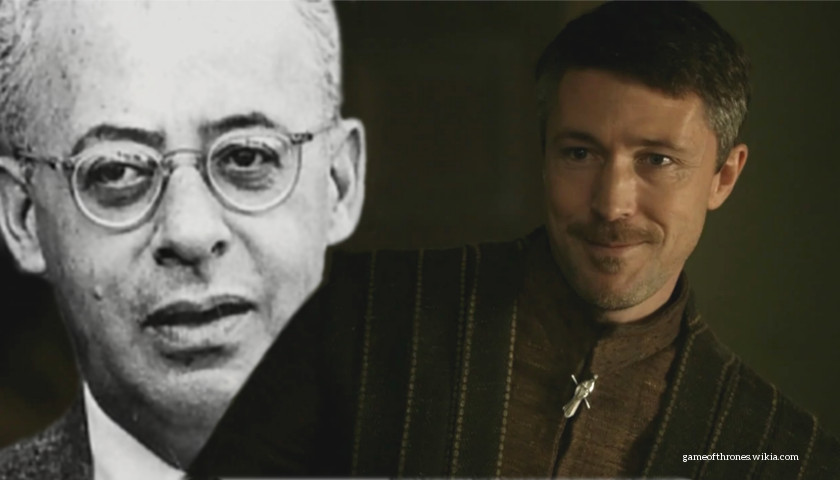I am unapologetically a fan of the HBO series Game of Thrones. In the episode, “The Climb,” the overly ambitious character, Petyr Baelish, aka Littlefinger, played masterfully by Aiden Gillen, delivers a speech that is eerily reminiscent of Saul Alinsky:
“Chaos isn’t a pit. Chaos is a ladder. Many who try to climb it fail and never get to try again. The fall breaks them. And some are given a chance to climb; they cling to the realm or the gods or love. Only the ladder is real. The climb is all there is.”
Essentially, Littlefinger is supporting a moral code that says everyone ought to be out for themselves. The only purpose in life is to gain power. Sound familiar? Power can only be accumulated through chaos, by using upheaval to rearrange things so that you gain power. The speech reads like a paragraph out of Rules for Radicals, with the word chaos replacing the word conflict. Issues such as patriotism, love, religious faith – are all things to be denigrated.
For Littlefinger, a character loathed by most fans, the tearing of the realm can create opportunities. For people who subscribe to his, or Alinsky’s theories on accumulating power for the sake of accumulating power, what is there left to rule over when you have destroyed the world? In 1972 as Alinsky was questioned by Playboy, the interviewer asked him: “Do you believe in any kind of afterlife?” Alinsky said if there was an afterlife he would “unreservedly choose to go to hell.” And while further explaining his answer: “Once I get into hell, I’ll start organizing…”
Emma Goldman, an anarchist in the first half of the twentieth century declared, “Religion, the dominion of the human mind; Property, the dominion of human needs; and Government, the dominion of human conduct, represent the stronghold of man’s enslavement and all the horrors it entails.” That radical response, which is embraced by Marxists, should be alarming to those in our country.
The levels of hypocrisy of most, who seek conflict, rather than attainable solutions to issues facing people, are rarely confronted. People should not be afraid to talk about their beliefs, stick up for those in the faith community who are under attack, and call out bigotry whenever or wherever we find it. When you want chaos or conflict, your goal is to continue the creation of problems, not find solutions to real problems. And if problems do not exist, you make them up. That is why some organizations and institutions are increasingly losing members, support and influence.
For example, in our organization and on a personal level we try to map-out a path toward a viable and sustainable solution on issues facing our members. Just recently, we were made aware of school district that had too many students in their class for a teacher. Our solution was not to go to the media and have the school district on the defense. We didn’t get on the school board agenda, and send letters to our members to embarrass the Superintendent. We simply called and talked to the Central Office. The problem was resolved in 5 minutes. The Director of Schools was simply unaware of the issue. That is leadership, and it doesn’t have to be built on pointless or unnecessary conflict.
Resolving issues is about people working together to resolve legitimate concerns. There are no hidden agendas when you build a culture motivated upon collaboration and problem solving. As an organization, our beliefs are practical and non-partisan, consisting of rational people across a broad political spectrum who will focus on solutions for our members. A solid strategy is critical in order to solve any problem. If your problem-solving creates chaos, that is a sign of a serious leadership problem. This never-ending cycle is not conducive to the adversity most people face. Solving problems consist of the transparent exchange of ideas, where the concerns and points of view of all people are freely expressed, not just those of the militant minority.
To relate this to my field of public education, we have to engage parents and taxpayers more on the great challenges we face. We cannot engage in frivolous lawsuits against our own school districts and expect Boards of Education to be responsive to legitimate concerns. Public education fails, when Alinsky tactics win. It isn’t hard to figure that out. We must work together.
In a Game of Thrones episode from this season, “The Spoils of War,” Bran Stark perhaps mockingly uses Littlefinger’s own words against him: “Chaos is a ladder.” This statement reveals that Bran understood the very heart of a master manipulator Petyr Baelish. He knows that Littlefinger is a self-centered, promoter of himself, more interested in power-plays and schemes, and being deceptive.
My guess is Petyr Baelish, will not hear the announcement, “Littlefinger, First of His Name, King of the Andals and the First Men, Lord of the Seven Kingdoms, and Protector of the Realm.” I am not even sure he makes it to the final season. He may be organizing hell with Alinsky, still in the middle of chaos—and there is no ladder there.
– – –
JC Bowman is the Executive Director of Professional Educators of Tennessee, a non-partisan teacher association headquartered in Nashville, Tennessee. Permission to reprint in whole or in part is hereby granted, provided that the author and the association are properly cited.





